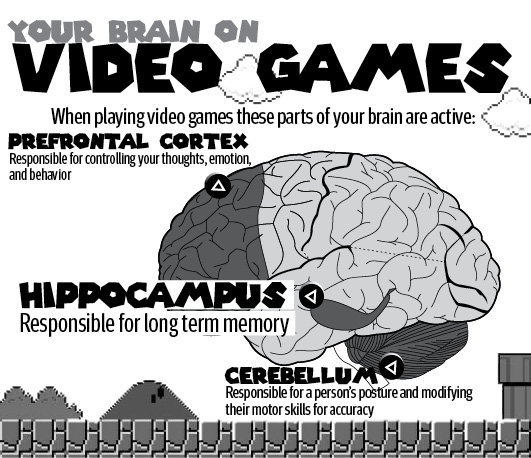
Chico State psychology students found that playing video games has positive effects.
Playing video games contribute to a person’s cognitive, motivational, emotional and social abilities, according to their research.
“I don’t play video games but I’m going to now,” said Priscilla Gates, a senior psychology major who participated in researching the subject.
Gates, along with other students in her group, presented their research at the College of Behavioral and Social Sciences Student Symposium April 23.
Playing video games affects the hippocampus of the brain, the area that regulates long-term memory and grows new brain cells, Gates said. She finds the benefits to be attractive.
“I’m trying to get neurogenesis because I have intractable insomnia,” she said.
Playing video games also affects the prefrontal cortex and cerebellum, according to the research. These areas of the brain are crucial for navigation, planning tactics, memory, motor performance and problem-solving.
Video games like competitive shooters can help people learn, focus and multitask, according to the research.
“It’s not easy to play video games,” Gates said. “I can’t even get my guy to stand up.”
Her son, who often plays online video games, is very competitive in school because he channels his video game competitiveness into his education, Gates said.
“I do like to one-up my friends in some cooperative games even though it’s a team effort game,” said Jennifer Decker, a sophomore computer science major. “I like to contribute more than my friends.”
Decker prefers single-player role-playing games compared to competitive multiplayer games, she said. She plays “Fallout,” “Dead Space” and “Assassin’s Creed.”
“I like the single-player experience more because I like storytelling,” she said. “It’s like reading a book – it’s intimate.”
There’s more strategy planning involved with role-playing games in terms of problem-solving, a skill she finds to be advantageous, Decker said.
“You’re constantly bombarded with puzzles in games – it’s not necessarily challenging but it makes your brain work strategically,” she said.
The reward systems in video games result in constructive behavior because achievement, recognition and satisfaction create an experience that motivate players to continue playing, according to the research by Gates and her classmates.
There are also social benefits when playing video games, especially online multiplayer role-playing games such as “World of Warcraft,” according to the research.
“‘World of Warcraft’ is an online game I used to play in high school and I was able to get my social stimulation,” said Decker. “Now I make friends though Chico State. I talk to others who like gaming; we’ll go online to play or we’ll meet up to play together.”
The research provides a theory that even violent video games can spark positive behaviors if people play cooperatively instead of competitively.
“The social reward people get from playing other people reinforces positive social ability,” Gates said. “It’s adding to people’s social lives. It’s not a replacement to the activity.”
Emotional benefits are also another positive aspect of gaming, according to the research. Gaming supports relaxation and gives people the illusion that they are in control.
“It really helps to take a step back and focus your attention on something else,” Decker said. “I use video games to get my mind off problems and calm down.”
Despite some perceptions of video games encouraging negative behavior, they also have positive sides including motivation and stress relief, said psychology professor Martin Van den Berg.
“Video games can be rewarding and addictive,” Van den Berg said. “From my perspective, what I see as most negative is timing. People spend too much time until late in the evening to play video games and they become sleep deprived. It’s important to give your brain enough rest.”
Students can overindulge in video games when it gets in the way of accomplishing goals, Van den Berg said.
“If I hug a tree for 20 hours, I’m not going to get my work done,” Gates said. “Video games are just like a brain vitamin, like a brain supplement – it strengthens other things in your life and it’s just fun doing it.”
Christine Lee can be reached at [email protected] or @leechris017 on Twitter.













